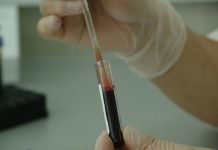LONDON, Aug. 27 (UPI) — A blood test that detects DNA mutations in the bloodstream can predict cancer relapses in patients before tumors are detectable in scans or symptoms are felt, according to a new study.
This new method of “liquid biopsies” is one of several meant to more easily tailor treatment to patients and their cancer, rather than apply blanket treatments and hope it applies to the type of cancer they have.
“We are moving into an era of personalized medicine for cancer patients,” said Paul Workman, chief executive of the Institute for Cancer Research, in a press release. “This test could help us stay a step ahead of cancer by monitoring the way it is changing and picking treatments that exploit the weakness of the particular tumor. It is really fantastic that we can get such a comprehensive insight about what is going on in the cancer all over the body, without the need for invasive biopsies.”
The researchers took tumor and blood samples from 55 women with early-stage breast cancer who had been treated with chemotherapy and surgery. Blood tests were taken every six months to continue monitoring patients.
Cancer starts with one rogue cell in the body, which grows and spreads to create tumors. After any type of cancer treatment, there often can be cells left in the body that have the potential to cause a relapse. Researchers were looking at the samples to detect cancer DNA in the bloodstream using a technique called mutation tracking, based on mutations in an individual’s cancer.
During the study, 15 women tested positive for potential relapse, which 12 actually experiencing one. Their relapse was predicted an average of 7.9 months before visible signs of the disease could be detected. The researchers said women who tested positive were roughly 12 times more likely to relapse than those who tested negative.
Researchers said that more work must be done for the test to be developed into something widely usable, however the hope is that not only can it be used for all breast cancer patients, but to predict relapses of other cancers as well — and treat them far earlier than they can be treated now.
“The key question is are we identifying that these women are at risk of relapse early enough that we could give treatments that could prevent the relapse?,” Dr. Nicholas Turner, a researcher at the Institute for Cancer Research, told the BBC. “That is unknown from this research and we hope to address it in future studies. [But] we’re really talking about a principle that could potentially be applied to any cancer that has gone through initial treatment for which there’s a risk of relapse in the future.”






